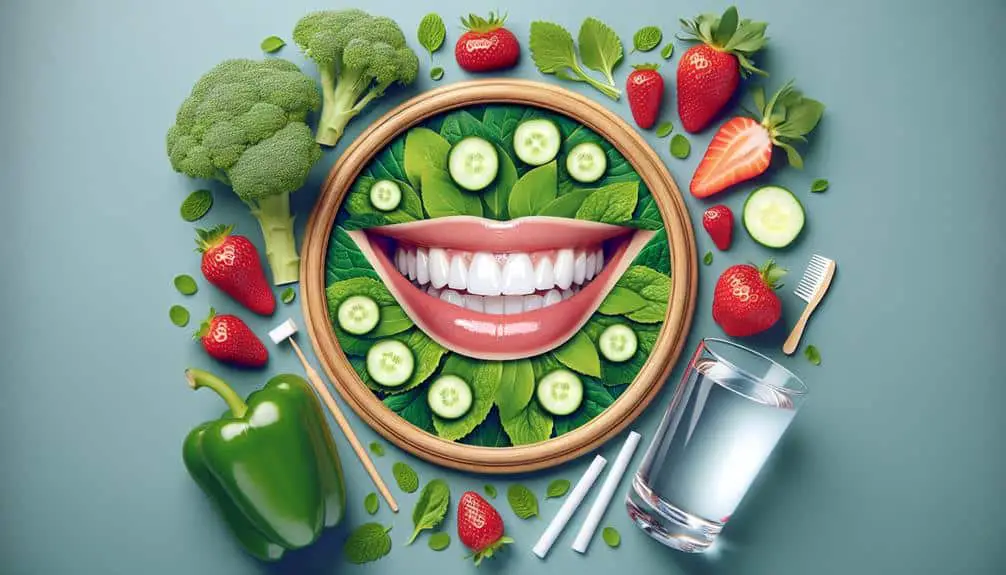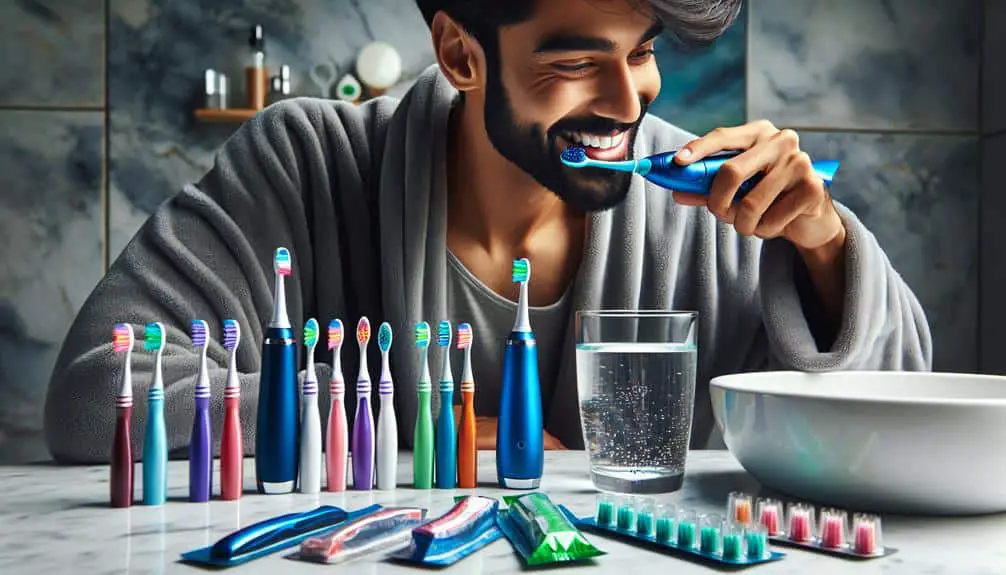To maximize your teeth whitening results, make sure you complete the treatment and follow post-whitening dental care guidelines meticulously. Be cautious of foods and beverages that can stain your teeth, limit dark-colored drinks, and consider using a straw. Maintaining excellent oral hygiene is key, so brush with fluoride toothpaste at least twice daily and make flossing a habit. Using whitening toothpaste can help prevent new stains – look for the ADA Seal. Remember to schedule regular dental check-ups for a thorough clean and to discuss your whitening goals with your dentist. These tips will help you achieve a brighter smile, so be sure to implement them for the best results.
Key Points
- Follow post-whitening dental care tips to prevent discoloration.
- Avoid staining foods and drinks like dark beverages and acidic foods.
- Maintain good oral hygiene by brushing twice daily and flossing.
- Use whitening toothpaste with the ADA Seal of Acceptance.
- Schedule regular dental check-ups to maintain optimal oral health.
Post-Whitening Dental Care Tips
After finishing a teeth whitening treatment, it's essential to follow specific post-whitening dental care tips to maintain and maximize the results. Preventing discoloration and enhancing brightness are key factors in prolonging the effects of your teeth whitening procedure. To prevent discoloration, avoid tobacco products, as they can quickly stain your teeth again. Additionally, limit your consumption of dark-colored foods and beverages that could potentially dull your smile.
Enhancing the brightness of your teeth can be achieved by practicing good oral hygiene habits. Brush your teeth at least twice a day with a whitening toothpaste to help remove surface stains. Floss daily to remove plaque and prevent stains from developing between your teeth. Another tip to maintain brightness is to rinse your mouth after consuming foods or drinks that could stain your teeth. By following these post-whitening dental care tips diligently, you can enjoy a brighter, whiter smile for a longer period.
Avoid Staining Foods and Drinks
To maintain the outcomes of your teeth whitening treatment, it's important to be mindful of the foods and drinks that can potentially stain your teeth. Preventive measures play a vital role in ensuring your teeth stay bright and white. Here are some lifestyle changes you can incorporate to avoid staining your teeth:
- Limit Dark-Colored Beverages: Drinks like coffee, tea, and red wine can contribute to teeth staining.
- Watch Your Intake of Acidic Foods: Acidic foods like citrus fruits can weaken the enamel, making it more susceptible to staining.
- Quit Smoking: Tobacco products contain substances that can quickly discolor your teeth.
- Use a Straw: When consuming beverages that may stain, using a straw can help minimize contact with your teeth.
Being proactive in avoiding these staining culprits can greatly contribute to the longevity of your teeth whitening results. Making these adjustments to your diet and habits won't only preserve your white smile but also promote overall oral health.
Maintain Good Oral Hygiene
Maintaining good oral hygiene is vital for preserving the results of your teeth whitening treatment. Consistent and thorough oral care practices, such as regular brushing and flossing habits, play a significant role in maintaining the brightness of your smile.
Brushing your teeth at least twice a day with a fluoride toothpaste helps remove surface stains and plaque buildup that can detract from the whiteness of your teeth. Additionally, incorporating flossing into your daily routine is essential for reaching areas between teeth where your toothbrush may not reach, preventing the accumulation of plaque and debris that can lead to discoloration.
Use Whitening Toothpaste
For enhanced teeth whitening results, consider incorporating a whitening toothpaste into your oral care routine. Whitening toothpaste can be a valuable addition to your daily regimen, helping to remove surface stains and prevent new ones from forming. When selecting a whitening toothpaste, look for one with the American Dental Association (ADA) Seal of Acceptance to guarantee its safety and efficacy.
Tips for Using Whitening Toothpaste:
- Brushing Technique: Proper brushing technique is essential for effective stain removal. Brush your teeth in gentle, circular motions for at least two minutes to guarantee thorough coverage.
- Enamel Protection: Opt for a whitening toothpaste that contains fluoride to strengthen enamel and protect against sensitivity that can sometimes accompany whitening products.
- Consistency: Use the whitening toothpaste consistently, at least twice a day, to maintain results and prevent new stains from setting in.
- Follow Instructions: Always follow the instructions provided with the toothpaste to achieve the best results without harming your teeth.
Incorporating a whitening toothpaste into your oral care routine can enhance your teeth whitening efforts while promoting overall oral health.
Schedule Regular Dental Check-ups
Scheduling regular dental check-ups plays a crucial role in maintaining optimal oral health and detecting any potential issues early on. These routine visits are essential for more than just teeth cleaning; they allow your dentist to assess your overall oral health, identify any concerns such as cavities or gum disease, and provide preventive measures to address them promptly.
Through regular cleanings, your dentist can remove plaque and tartar buildup that regular brushing and flossing might miss, preventing issues that could lead to discoloration or other dental problems. Additionally, these appointments offer an opportunity for your dentist to discuss your teeth whitening goals and tailor recommendations to maximize results while ensuring the health of your teeth and gums.
Frequently Asked Questions
Can Teeth Whitening Cause Tooth Sensitivity?
Teeth whitening can cause tooth sensitivity by temporarily opening the pores of your enamel. To manage this, use desensitizing toothpaste before and after treatment. Prevent enamel damage by following recommended guidelines and consulting your dentist.
How Long Do Teeth Whitening Results Typically Last?
Teeth whitening results typically last several months, influenced by factors like diet, oral hygiene, and habits. Touch-up treatments may be needed every 6-12 months. Longevity is extended with a maintenance routine and avoiding staining habits.
Are There Any Natural Remedies for Maintaining Whiter Teeth?
To maintain whiter teeth naturally, incorporate oil pulling and charcoal for a deep clean. Baking soda and strawberries can also help brighten your smile. These remedies, used consistently, can enhance the appearance of your teeth.
Can Smoking Affect the Results of Teeth Whitening Treatments?
Smoking tobacco can greatly affect your teeth whitening results. The nicotine in cigarettes can impede the success of whitening treatments by causing stains and discoloration. It's essential to quit smoking to achieve ideal whitening outcomes.
Is Professional Teeth Whitening Worth the Cost Compared to At-Home Whitening Kits?
When considering professional teeth whitening versus at-home kits, cost effectiveness and professional benefits are essential. Professional treatments often yield quicker, more noticeable results and are tailored to your needs, making them worth the investment for best whitening outcomes.



